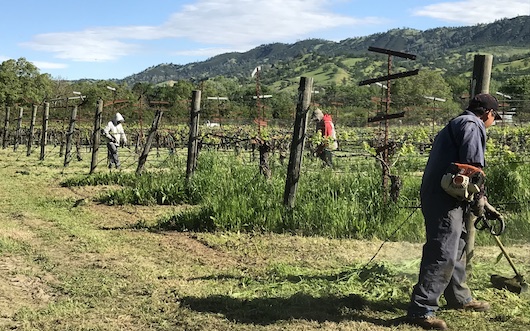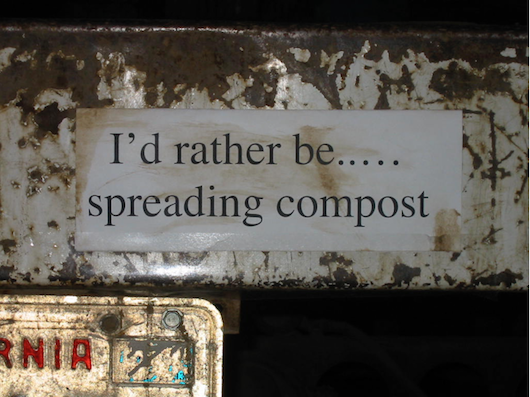
Wow… three weed eaters in working condition at the same time!
“What is your worst pest?” – this is a common question asked by visitors to the farm. Weeds are definitely up there on my list — sometimes there seem to be more weeds than there are crops. The spring weather brings our weed-eaters out, and with them, drifting on the wind to all corners of the farm, are the constant sounds of those little high-pitched engines moving through the vineyard and along field edges. By the end of the day, the workers’ clothes are coated in dust and plant parts, and their joints are zinging. Everyone is happy to put the weed eaters down overnight.
Other weed controlling practices used at Full Belly include plastic mulch on the beds, lots of cultivation with tractors, and hand hoeing. Our herbicide-using friends probably scratch their heads and wonder, wouldn’t it be a lot easier, more convenient and even cheaper to mix up an herbicide and just go out and spray the fields? More calculating is the messaging from the companies that make the herbicides who ridicule organic practices and say (incorrectly), “Without herbicides, crop yields would plummet.”
So why don’t organic growers use chemical herbicides? Well here are a couple of cautionary tales: There is an herbicide called dicamba that is used to kill broad-leafed weeds in soybeans. Many growers have planted soybeans bred to be resistant to the dicamba and now, when one farmer uses dicamba and it drifts to a neighboring field, all the neighbors’ soybeans are badly damaged if they don’t have the special bio-engineered gene. Dicamba drift damage is estimated on more than one million acres of crops, so now neighbors are suing neighbors, but the Corporate Captains at Monsanto are standing firm: “We’ve been very pleased… from a weed control standpoint.” I guess Monsanto just expects everyone who grows soybeans to be forced to buy the genetically engineered seed from them.
Glyphosate, of course, is the other cautionary tale. This is the active ingredient in Roundup, a herbicide that kills both broadleaf plants and grasses. It is the world’s most widely used herbicide, with 3.5 billion pounds used in the U.S. since 1974 (that’s 19% of the use worldwide). If you are 45-years old or less, this ubiquitous chemical has been affecting you directly for your entire life! Trace amounts of it have been found in food products like corn, flour, crackers and honey, as well as fresh food and infant food.
Research developed over the last several decades has indicated that contrary to previous belief, glyphosate is a probable human carcinogen. Thousands of people across the country have sued Monsanto alleging that glyphosate (and Roundup, the product that contains it) caused them to develop non-Hodgkin’s lymphoma, a type of blood cancer.
I’m glad not to use those chemicals on the farm because I live right here and I think that the public is a long way off from really understanding the impacts on humans and the environment. Since most of the research on these products is done by the chemical companies who stand to profit from them, I’d rather not risk the long-term health of our staff and CSA members. This is another reason why it makes sense to have a relationship with the farm that grows your vegetables. With your membership, you are supporting our efforts to farm with weeds, weed-eaters and non-GMO seeds.
Thank you and Blessings on Your Meals!
—Judith Redmond

